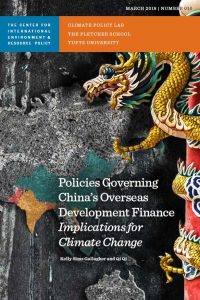
New publication on China’s foreign direct investment
Climate Policy Lab is pleased to present a new report by Kelly Sims Gallagher and Qi Qi on the policies governing China’s foreign direct investment. Please see our key findings in English and Chinese below.
Motivated by concerns about the climate implications of China’s overseas investments, this paper identifies and evaluates Chinese policies governing China’s foreign direct investment and focuses particularly on how those policies influence environmental outcomes in recipient countries. Policies governing domestic investments are also examined in order to clarify inconsistencies between domestic and overseas policies. A few key findings:
- While the governance system for overseas investment has matured in recent years, the policies governing the environmental dimensions of China’s FDI are still relatively weak and mostly voluntary in nature.
- The Chinese government has streamlined the overseas investments approval process and has shifted its emphasis to post-investment monitoring and supervision.
- Chinese firms and investors are mainly required to adhere to the environmental policies of the recipient countries.
- There are no policies specifically aimed at limiting emissions of climate-altering greenhouse gases.
- The environmental policies governing China’s overseas investments are not as strict as those governing domestic investments.
- The Chinese government’s go-out strategy and industrial policies in support of strategic industries could result in sustained green investments overseas since many of China’s strategic industries are, in fact, green.
1999年中国政府确定“走出去”战略以来,中国对外直接投资开始快速增长,并在2013年习主席提出一带一路倡议之后飞速发展,目前中国已成为最不发达国家和地区最大投资国、亚洲发展中国家最大投资国和非洲第四大投资国。出于对中国海外投资碳足迹的关注,本研究梳理了中国企业海外投资监管政策,评估了这些政策对中国海外投资在东道国环境的影响。本研究同时考察了中国国内的产业投资政策,并与中国外海投资政策进行了比较,探究了两者之间的协调和连贯性。本研究发现:
– 尽管中国海外投资的治理系统已经逐渐完善,针对中国海外投资的环境治理政策仍相对薄弱,且大多数本质上是自愿执行。
– 中国政府完善了海外投资审批过程,已将重点转移到了投资后的追踪和监管。
– 中国政策主要是要求海外投资的中国企业和投资者服从东道国的环境监管政策。
– 目前中国海外投资政策尚未将气候变化相关的温室气体减排纳入监管目标。
– 与国内投资的环境监管相比,中国海外投资的环境政策监管力度相对较弱。
– 目前中国战略新兴产业大多数属于绿色产业,“走出去”战略和支持战略新兴产业政策的结合是可能推动中国可持续和绿色的海外投资。
